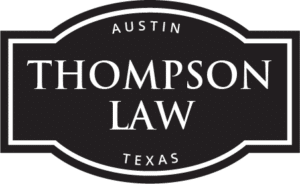Divorce Lawyers
High-Net-Worth Divorce Solutions
Protect $1M+ Assets
Austin, TX
Amicable if possible, aggressive if necessary.
Ending a marriage causes emotional and financial strains and stresses for everyone, even in the most amicable of divorces. This is only heightened when child custody, complex property division, and high net-worth estates are involved, for example.
Wherever you need support, from mediation, to negotiations, to fighting for you in the courtroom, hire a lawyer you can trust at Thompson Law. Contact us today to book your consultation.
Schedule Your Consultation
Call our office or complete the form below to request your consultation.
Thompson Law Understands
We understand the hardships and difficulties clients face when their marriage comes to an end, and we provide attentive personal services to those taking the next step toward starting something new. Working as your ally and advocate through each step in the divorce process, we put your concerns at ease, whether faced with tough negotiations or a courtroom battle. We take a fair, firm, and reasonable approach whenever possible, but we’re always ready to take an aggressive approach whenever necessary to protect your future, both financially and emotionally.
What if my former spouse contests the divorce?
Sometimes, the messy and stressful processes of divorce can be unavoidable when the former spouse does not want to get divorced, or does not agree about child-related matters or the division of marital assets and liabilities. When a resolution cannot be reached due to disagreement between two parties, the divorce is considered contested, and the case will proceed in court, with a judge deciding the outcome of all issues that the spouses themselves cannot agree upon. We assist clients through each step of the divorce process, whether uncontested or contested divorce, whether resolved in the courtroom or outside of court by agreement, offering a tough but fair approach to fight for the best outcome for you.
Phone
Address
3601 S. Congress
Suite B200
Austin, TX 78704
Types of Support We Can Offer in Divorce Cases
Contested Divorce involving Child Custody or Support
Contested Divorce involving Complex Property Division
Separate Property rights, including forensic accounting and asset tracing
High-Net-Worth and Large Estate Divorces
Divorces involving business owners
Complex tax situations or bankruptcies and divorce
Divorces involving Prenups
Divorce trials and formal courtroom proceedings
Mediated Divorce and out-of-court settlements
Divorce Decree Modifications and Enforcements
Asset Valuation, including houses, pensions and other retirement
Spousal Support, Alimony, or Post-Divorce Spousal Maintenance
The Divorce Process
If you’re filing for a divorce in the State of Texas, there may be some processes and considerations that you need to think about before you start formal divorce proceedings. Our team of legal experts can help guide you through this process so you know what to expect based on your unique family and financial situation.

Residency Requirement
First, check your residency status in the state. Have you been a Texas resident for the last six months? One of the spouses must also be a resident of the county for at least 90 days before filing for a divorce in that county.
Filing the Petition
This is the start of the divorce process. One of the parties must file a petition called the “Original Petition for Divorce” and pay the required court fee. The papers are then served upon the other spouse, typically using a private process server. At this time, the Court also issues a standard Temporary Restraining Order (TRO), known locally as a “Standing Order,” requiring, among other things, that no assets disappear before they can be divided by the court and that the spouses act civilly and respectfully toward one another and maturely with respect to the children if any.
Exchanging Information
The formal, court-mandated process of information sharing during a divorce case is known as “discovery.” The purpose of discovery is to ensure that both parties have access to all information that is relevant to child-related and financial issues, such as bank and other financial account statements, pay stubs, credit card statements, and tax returns, among other things. In many divorce cases, the discovery process is handled by agreement, meaning that the parties themselves decide the scope and timing of exchanging information. In other divorce cases, typically contested ones that proceed in court, the parties exchange the information and documents required to be exchanged under the Texas Rules of Civil Procedure, which requires that each party produce large numbers of documents ranging across large periods of time, and which drives up the costs of the divorce case for each party. Sometimes this is necessary because one spouse is hiding assets, for example. We can assist you in securing the appropriate and necessary documents and evidence to support your case in negotiations and in court.
The divorce hearing and trial
In some cases, the spouses will appear in court several times before their divorce case is finalized in court by trial, with the judge deciding how family and financial issues will be handled while the divorce is ongoing and the final outcome of all child-related and property division issues. This most often occurs when the spouses cannot agree upon child-related issues, such as custody, child support, or visitation, or when there is a disagreement over the division of high-net-worth estates or complex asset, liability, or tax situations. Other cases may require only one hearing to resolve interim issues that arise during the divorce process, and this type of hearing is known as a “Temporary Orders Hearing.” If there is no disagreement on child-related or financial issues between the parties, then it may be unnecessary for either party to attend or appear in court at any time, meaning that the divorce case can be started and finished without going to court, if handled properly by an experienced divorce attorney.

Grounds for Divorce under Texas State Law
In the State of Texas, there are two types of grounds for divorce: no-fault divorce and divorce for cause. The path you choose to take depends on the reasons you and your spouse are divorcing.
- One type of divorce case is a no-fault divorce, which means the marriage is untenable and can no longer be maintained due to conflict between the spouses or fundamental personality differences, which are not the fault of one spouse or the other. This route is typically the most time- and cost-efficient, reducing stress for both parties. Financial settlements are usually based on individual needs and unique circumstances, measured against what would most likely occur if the case were presented in court for a local judge to decide the outcome.
- The second type of divorce case under Texas State Law is a fault-based divorce or divorce for cause. A client may wish to proceed with a fault-based divorce if the marriage has ended due to their partner’s behavior or wrongdoing. Grounds for fault-based divorce can be adultery, cruelty, abandonment, domestic violence or child abuse, felony convictions, or financial or tax wrongdoing. Most fault-based divorce cases need to be resolved in the courtroom. If you are considering taking this route, you should consider speaking with a lawyer first to ensure you have sufficient evidence to support a fault-based divorce for cause.
- Making a decision on which route is best for you during your divorce will depend on your reasons for separation and your desired outcome. Whichever route you decide to take, the Thompson Law team can help to support you each step of the way, from negotiations to mediation, to the courtroom, if necessary, to help you get the result you deserve. Contact us today to book a consultation.
Let’s Find a Solution
Thompson Law is the skillful advocate and ally you need. If you’re facing divorce, criminal charges, or another difficult family law situation, Thompson Law is ready to fight for you both in and out of the courtroom to help find the best outcome for you.
Related Posts
Avoid Public Scrutiny in High-Asset Divorce
Divorcing with significant assets can feel like navigating a minefield, especially for individuals accustomed to privacy. Beyond the emotional and logistical challenges, high-asset divorces bring an added burden—public scrutiny. The potential for exposure is immense...
Navigating Business Ownership and Divorce with Confidence
If you’re going through a high-asset divorce, you are likely in an emotional and stressful time. There are many layers to high-net-worth divorces, including personal assets and business finances, and these only add to the complexity of your case if you’re a business...
Property Division In Divorce Texas Law Guide
In Texas, property division in a divorce follows the principles of community property law. This means that any property acquired by either spouse during the marriage, with a few exceptions, is considered community property and subject to division upon divorce. Property owned by a spouse prior to the marriage or acquired during the marriage by gift or inheritance is considered separate property and is not subject to division upon divorce, for example.



